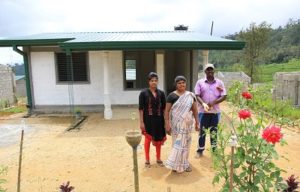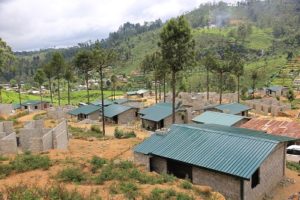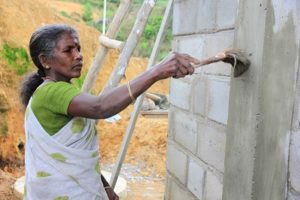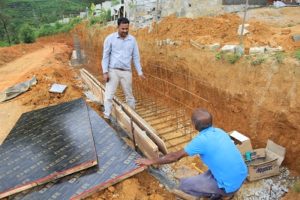Construction of Permanent Houses for Estate Workers Underway in Nuwara Eliya District with support from the Government of India and UN-Habitat
Nuwara Eliya District, Sri Lanka. The United Nations Human Settlements Programme (UN-Habitat) in partnership with the Government of Sri Lanka, Regional Plantation Companies, communities and Estate Worker Housing Cooperative Societies is constructing permanent houses for workers in two estates in Nuwara Eliya district. Funded by the Government of India, the Indian Housing Project in the Central and Uva Provinces (IHP-CUP) is implemented by UN-Habitat in close collaboration with the Ministry of Hill Country New Villages, Infrastructure and Community Development. During the first phase, 554 houses are being constructed for estate worker families who are currently residing in dilapidated line rooms with minimal, basic facilities.
Human Settlements Programme (UN-Habitat) in partnership with the Government of Sri Lanka, Regional Plantation Companies, communities and Estate Worker Housing Cooperative Societies is constructing permanent houses for workers in two estates in Nuwara Eliya district. Funded by the Government of India, the Indian Housing Project in the Central and Uva Provinces (IHP-CUP) is implemented by UN-Habitat in close collaboration with the Ministry of Hill Country New Villages, Infrastructure and Community Development. During the first phase, 554 houses are being constructed for estate worker families who are currently residing in dilapidated line rooms with minimal, basic facilities.
 The construction work is currently well under way in the Dayagama and Dunsinane estates. Construction work has commenced in a total of 172 houses, with 61 in Dayagama and 111 in Dunsinane estate. Over 100 houses have currently reached roof level, 123 are at lintel level and 32 are close to finishing. The project is implemented through a participatory people’s process. Estate worker families are closely involved in planning and monitoring of construction while construction of the houses is undertaken through the Estate Worker Housing Cooperative Societies (EWHCS). The High Commission of India is channelling funds through the EWHCS who hire skilled construction workers, bulk purchase building materials and construct houses. Each house is 550 square feet, consisting of a front veranda, sitting room, two bedrooms, a kitchen and a toilet.
The construction work is currently well under way in the Dayagama and Dunsinane estates. Construction work has commenced in a total of 172 houses, with 61 in Dayagama and 111 in Dunsinane estate. Over 100 houses have currently reached roof level, 123 are at lintel level and 32 are close to finishing. The project is implemented through a participatory people’s process. Estate worker families are closely involved in planning and monitoring of construction while construction of the houses is undertaken through the Estate Worker Housing Cooperative Societies (EWHCS). The High Commission of India is channelling funds through the EWHCS who hire skilled construction workers, bulk purchase building materials and construct houses. Each house is 550 square feet, consisting of a front veranda, sitting room, two bedrooms, a kitchen and a toilet.
UN-Habitat provides technical guidance including the preparation of house type plans, Bills of Quantities (BOQs) and technical supervision on the construction aspects including the selection of quality building materials.
Due to the fragile and complex nature of the hilly terrain in  the central province, disaster risk reduction measures have been incorporated into the house construction. These include deep column footings, step foundations, corner columns, external plinth beam, continuous lintel and roof anchoring. Environmentally friendly building materials and techniques are used in all houses, including the use of fair-faced blocks for walls, twin pit latrines and smoke free chimneys. Kitchen gardens and tree planting activities are also being carried out by families to improve the environment. Geo-technical clearance of the National Building Research Organization (NBRO) has been obtained for all the sites. Landscaping features have been introduced in all settlements with live fences erected around the houses.
the central province, disaster risk reduction measures have been incorporated into the house construction. These include deep column footings, step foundations, corner columns, external plinth beam, continuous lintel and roof anchoring. Environmentally friendly building materials and techniques are used in all houses, including the use of fair-faced blocks for walls, twin pit latrines and smoke free chimneys. Kitchen gardens and tree planting activities are also being carried out by families to improve the environment. Geo-technical clearance of the National Building Research Organization (NBRO) has been obtained for all the sites. Landscaping features have been introduced in all settlements with live fences erected around the houses.
 Complementary to the funding received by the Indian Government, the Korea International Cooperation Agency (KOICA) is providing funding to UN-Habitat to develop external infrastructure for the new settlements, under which a composite waste water management system combining rainwater harvesting and recycling of domestic waste water for homestead cultivation is being developed as a pilot exercise. Drainage structures and slope retaining structures are also being constructed through this project entitled “Human Development Initiative through Empowerment and Settlement Improvement in the Plantation Settlements in Sri Lanka”.
Complementary to the funding received by the Indian Government, the Korea International Cooperation Agency (KOICA) is providing funding to UN-Habitat to develop external infrastructure for the new settlements, under which a composite waste water management system combining rainwater harvesting and recycling of domestic waste water for homestead cultivation is being developed as a pilot exercise. Drainage structures and slope retaining structures are also being constructed through this project entitled “Human Development Initiative through Empowerment and Settlement Improvement in the Plantation Settlements in Sri Lanka”.
The overall IHP-CUP project involves the construction of 4,000 houses and UN-Habitat is one of four implementing agencies of the project. The Indian Government is providing approximately US$30 million funding for the project over the next two years. The 4,000 houses is a part of India’s overall commitment to fund the construction of 50,000 houses in conflict-effected and plantation regions of Sri Lanka.
